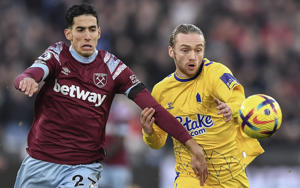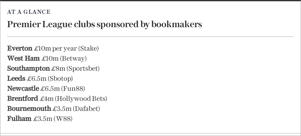
© Vince Mignott/GETTY Nayef Aguerd of West Ham United (L) and Tom Davies of Everton (R) in action during the Premier League match between West Ham United and Everton FC – Gambling firms banned from sponsoring Premier League football shirts – Vince Mignott/GETTY
The Premier League has become the first UK sports league to voluntarily restrict gambling sponsorship, banning shirt adverts from 2026.
In a move that will particularly affect sponsorship options for those outside the top six, clubs will no longer be able to display an advert for a betting firm on the front of their matchday kit.
Everton, West Ham United, Bournemouth, Southampton, Brentford, Fulham, Leeds and Newcastle United have deals for front-of-shirt sponsorship with gambling firms. Those deals are collectively worth about £60m each season.

© Provided by The Telegraph Premier League clubs sponsored by bookmakers
Aston Villa and Wolverhampton Wanderers have a betting firm as their sleeve sponsor but the new rules, which were agreed by 18 of the 20 Premier League clubs (with two abstaining), will only apply to the main front logos. LED stadium advertising for gambling companies will also be unaffected.
The long period of grace means that clubs can honour existing sponsorship deals, with 2026/7 the first season from which gambling firms cannot buy one of the most prominent advertising spaces in world sport.
None of the top six clubs have a betting form as their main shirt sponsor while Newcastle, who look best-placed to break into that elite, have a £6.5m-a-year deal with Fun88 that is due to expire at the end of this season, following their takeover by Saudi Arabian investors.
It is a particularly significant change for clubs lower down the Premier League, and especially those who have been recently promoted, when finding a long-term partnership can be difficult because of their uncertain league status.
Negotiations on sponsorship partnerships with blue-chip companies can often take many months to agree and so are more unlikely for a newly promoted club who might have just a matter of weeks to maximise their Premier League status.
The Premier League is now also working with other sports on the development of a new gambling sponsorship code. A long-awaited white paper on gambling is due to be published by the Government in the coming weeks but a similar shirt ban in respect of the English Football League is not expected.
Selective ban is ‘totally incoherent’
Campaigners have questioned the logic of such a selective ban. “It is a significant acceptance of the harm caused by gambling sponsorship,” said Big Step, a campaign group which wants to end gambling advertising and sponsorship in football. “But just moving logos to a different part of the kit while allowing pitch-side advertising and league sponsorship to continue is totally incoherent.
“Without government action on all forms of gambling ads in football, at every level, online casinos will exploit any voluntary measures and continue to market their products through our national sport.
“Although this outcome isn’t perfect, it’s a huge step. The government and the sport itself now need to wake up to the reality that gambling ads are unhealthy, unpopular and will be kicked out of football. Delaying that moment is risking the health and lives of another generation of young fans.”
Culture Secretary Lucy Frazer welcomed the move. “While the vast majority of adults enjoy gambling without harm, we can’t ignore the fact footballers are massive role models to kids,” she said.
“Our upcoming gambling White Paper will upgrade punter protections and do more to protect those at risk of addiction. We want to work with institutions like the Premier League to do the right thing for young fans.”
Tony Bloom, the owner of Brighton & Hove Albion and one of the most renowned sports gamblers, is among those who have backed a ban on shirt sponsorship. “From a personal point of view, it’s really important to be aware of children seeing gambling or betting advertising on the shirt in particular, because they buy shirts,” he said.
“I don’t think having gambling sponsorship on shirts is good, but I understand that for some clubs, particularly clubs down the leagues with much less revenue, the gambling companies pay the best so it’s a difficult decision to turn them down.
“Although there is gambling advertising all around, I just think on the shirts it’s the most obvious, so that would give me the most concern.”